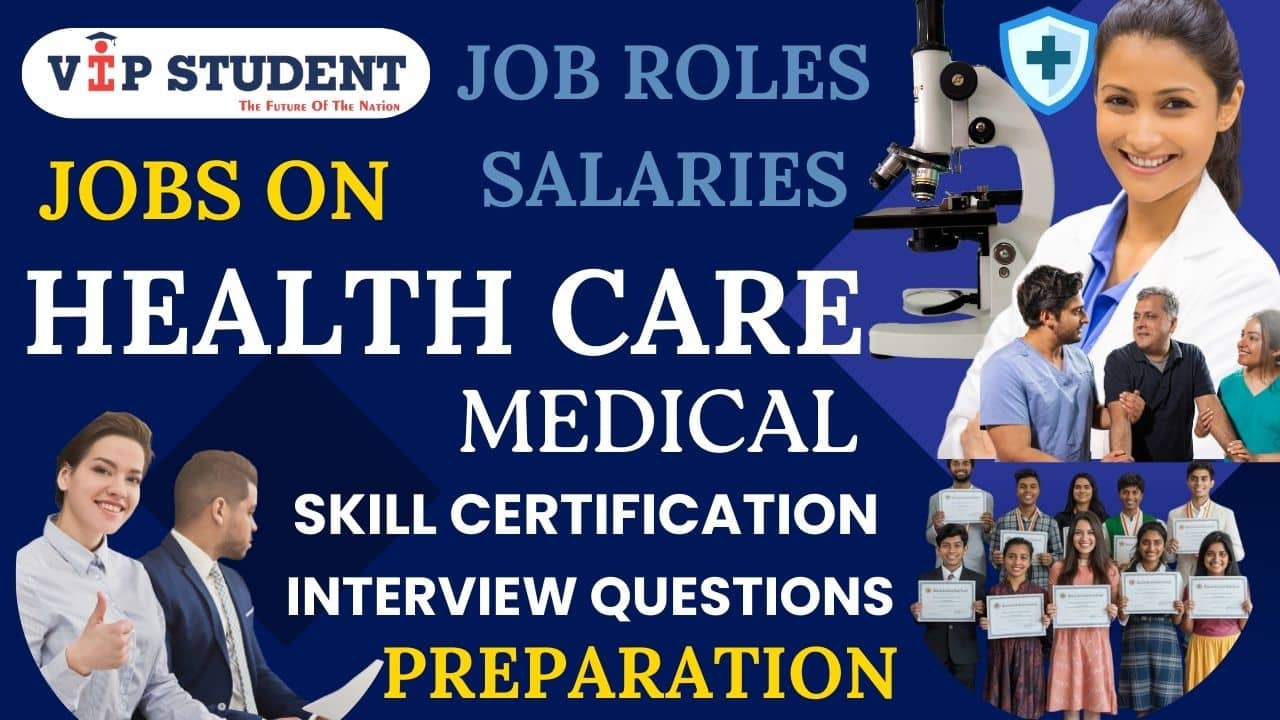LET’S KNOW ABOUT MEDICAL – HEALTH CARE JOB ROLES, REQUIRED SKILLS,SALARY PARTICULARS, PRACTICE JOB INTERVIEW QUESTIONS AND GET CERTIFIED ON YOUR MEDICAL – HEALTH CARE SKILLS
MEDICAL – HEALTH CARE JOBS: The healthcare sector is not limited to doctors. A wide network of professionals works behind the scenes to ensure smooth patient care, diagnostics, therapy, and hospital management. These roles offer job security, emotional satisfaction, and steady income, especially in a country like India with a growing population and healthcare awareness. From nursing to diagnostics, administration to rehabilitation, there is a growing demand for skilled professionals in both public and private healthcare sectors. This blog explores the various non-doctor medical job roles, skills required, and career prospects in the Indian healthcare ecosystem.
🏥 Jobs on Medical and Healthcare Skills and Career Opportunities in India (Excluding Doctors)
🩺 1. Nursing (Staff Nurse, ICU Nurse, OT Nurse)
Overview: Nurses are the backbone of the healthcare system. They provide round-the-clock care to patients, assist doctors, and handle critical care procedures in hospitals and clinics.
- Qualifications: Diploma in General Nursing and Midwifery (GNM), B.Sc. Nursing.
- Skills: Clinical knowledge, compassion, communication, emergency response.
- Workplaces: Hospitals, clinics, home healthcare, military, old-age homes.
Job Outlook: High demand due to shortage of skilled nurses in both urban and rural areas.
🧪 2. Medical Laboratory Technician (MLT)
Overview: Lab technicians collect, test, and analyze blood, urine, and tissue samples to help diagnose medical conditions.
- Qualifications: Diploma or B.Sc. in Medical Laboratory Technology.
- Skills: Attention to detail, lab safety, familiarity with diagnostic tools.
- Workplaces: Pathology labs, hospitals, blood banks, diagnostic centers.
Job Outlook: Growing as diagnostic services become more accessible and necessary.
💊 3. Pharmacist
Overview: Pharmacists are responsible for dispensing medicines, verifying prescriptions, and advising patients on medication usage.
- Qualifications: D.Pharm or B.Pharm.
- Skills: Pharmacological knowledge, precision, customer interaction.
- Workplaces: Hospitals, medical stores, pharmaceutical companies.
Job Outlook: Consistently in demand, especially in tier-2 and rural areas.
🩻 4. Radiology and Imaging Technologist
Overview: These professionals operate X-rays, MRI, and CT scan machines, producing images used by doctors for diagnosis.
- Qualifications: Diploma/B.Sc. in Radiology or Imaging Technology.
- Skills: Technical expertise, safety protocols, patient handling.
- Workplaces: Hospitals, diagnostic centers, mobile scan vans.
Job Outlook: Increasing use of advanced imaging makes this a high-demand field.
🧘♂️ 5. Physiotherapist
Overview: Physiotherapists help patients recover from injuries, surgeries, or neurological conditions using physical exercises and therapy.
- Qualifications: Bachelor in Physiotherapy (BPT).
- Skills: Knowledge of human anatomy, empathy, physical endurance.
- Workplaces: Hospitals, rehabilitation centers, gyms, home visits.
Job Outlook: Rising due to lifestyle diseases and post-COVID recovery needs.
🧾 6. Medical Billing and Coding Specialist
Overview: These professionals translate patient records into standardized codes for billing, insurance claims, and medical records.
- Qualifications: Diploma/certificate in medical coding.
- Skills: Computer knowledge, understanding of ICD and CPT codes, accuracy.
- Workplaces: Hospitals, third-party billing agencies, health insurance firms.
Job Outlook: Growing due to digitization and insurance sector expansion.
👩⚕️ 7. Healthcare Assistant / Patient Care Attendant
Overview: These workers help patients with daily activities like bathing, feeding, and mobility, especially in elderly or post-surgical care.
- Qualifications: 10th pass + short healthcare assistant training.
- Skills: Patience, hygiene knowledge, basic caregiving.
- Workplaces: Hospitals, home care services, old-age homes.
Job Outlook: Highly in demand in cities due to aging population and home healthcare trend.
🏥 8. Hospital Administration & Management
Overview: Administrators manage the non-clinical operations of hospitals such as HR, finance, compliance, and logistics.
- Qualifications: MBA in Hospital Administration or Healthcare Management.
- Skills: Leadership, problem-solving, healthcare law knowledge.
- Workplaces: Hospitals, clinics, health NGOs, diagnostic chains.
Job Outlook: Rising demand for professional hospital management across India.
🚑 9. Emergency Medical Technician (EMT)
Overview: EMTs provide immediate care in emergencies like accidents, heart attacks, or trauma before hospital admission.
- Qualifications: EMT certification (1-year course).
- Skills: First aid, CPR, quick decision-making, stamina.
- Workplaces: Ambulance services, emergency departments, disaster response teams.
Job Outlook: High need due to growth in ambulance services and trauma care.
🥗 10. Dietitian/Nutritionist
Overview: They design meal plans and counsel patients on dietary changes for medical conditions or wellness goals.
- Qualifications: B.Sc. or M.Sc. in Nutrition and Dietetics.
- Skills: Nutritional knowledge, patient counseling, monitoring.
- Workplaces: Hospitals, wellness centers, gyms, private practice.
Job Outlook: Increasing awareness of lifestyle and diet-linked diseases is driving demand.
🧾 Experience-Wise Salary Particulars in Indian Healthcare Roles
| Job Role | Key Skills | Entry-Level (0–2 yrs) | Mid-Level (2–5 yrs) | Senior-Level (5+ yrs) | Avg. Salary Range (INR/year) |
|---|---|---|---|---|---|
| Staff Nurse | Patient care, clinical procedures | ₹2 – ₹3.2 LPA | ₹3.2 – ₹5 LPA | ₹5 – ₹6.5+ LPA | ₹2.5 – ₹6 LPA |
| Lab Technician | Sample collection, lab testing | ₹1.5 – ₹2.5 LPA | ₹2.5 – ₹4 LPA | ₹4 – ₹4.5+ LPA | ₹1.8 – ₹4.5 LPA |
| Pharmacist | Prescription handling, dosage accuracy | ₹1.8 – ₹2.8 LPA | ₹2.8 – ₹4.2 LPA | ₹4.2 – ₹5.5 LPA | ₹2 – ₹5 LPA |
| Radiology Technician | Imaging (X-ray, CT, MRI), equipment use | ₹2.2 – ₹3.5 LPA | ₹3.5 – ₹5.5 LPA | ₹5.5 – ₹7+ LPA | ₹2.5 – ₹6.5 LPA |
| Physiotherapist | Rehabilitation, physical therapy | ₹2 – ₹3.5 LPA | ₹3.5 – ₹5.2 LPA | ₹5.2 – ₹6.5+ LPA | ₹2 – ₹6 LPA |
| Medical Coder | ICD-10, CPT coding, billing systems | ₹2 – ₹3.2 LPA | ₹3.2 – ₹4.5 LPA | ₹4.5 – ₹5.5+ LPA | ₹2.5 – ₹5.5 LPA |
| Patient Care Assistant | Basic care, mobility aid, hygiene | ₹1.2 – ₹2.2 LPA | ₹2.2 – ₹2.8 LPA | ₹2.8 – ₹3.5 LPA | ₹1.5 – ₹3 LPA |
| Hospital Administrator | Hospital ops, compliance, HR/finance | ₹3 – ₹5 LPA | ₹5 – ₹8 LPA | ₹8 – ₹12+ LPA | ₹3 – ₹10+ LPA |
| EMT (Emergency Tech) | First aid, CPR, trauma care | ₹2 – ₹3 LPA | ₹3 – ₹4 LPA | ₹4 – ₹4.5+ LPA | ₹2 – ₹4.5 LPA |
| Dietitian/Nutritionist | Diet plans, patient counseling | ₹2 – ₹3.5 LPA | ₹3.5 – ₹5 LPA | ₹5 – ₹6.5+ LPA | ₹2.5 – ₹6 LPA |
- Salaries vary depending on hospital type (govt/private), city tier, certifications, and specializations.
MEDICAL – HEALTH CARE JOB INTERVIEW QUESTIONS AND ANSWERS
✅ 1. Staff Nurse – Interview Questions & Answers
1. What steps do you take to maintain patient hygiene?
I follow protocols like daily baths, oral care, clean bedding, and timely diaper changes for immobile patients.
2. How do you handle a medical emergency?
I immediately assess the ABCs (Airway, Breathing, Circulation), alert the code team, and begin CPR or necessary first aid.
3. How do you manage multiple patients at once?
I prioritize based on criticality, use charts and checklists, and ensure timely medication and vitals monitoring.
4. What is your experience with IV line insertion?
I’m confident in venipuncture, IV cannulation, and managing drips or infusion pumps.
5. How do you communicate with doctors and patient families?
Clearly, respectfully, and with empathy—providing accurate updates and listening actively.
6. How do you handle aggressive or non-cooperative patients?
I remain calm, listen to concerns, and involve senior staff or a counselor if needed.
7. What do you do before administering medication?
I verify the “5 Rights”: Right patient, drug, dose, time, and route.
8. How do you handle documentation?
I ensure real-time, accurate entries in patient charts—vitals, medication, progress notes, and nursing handover.
9. Have you worked in ICU or OT?
Yes, I have hands-on experience monitoring critical patients and assisting in sterile surgical procedures.
10. What would you do if you noticed a medication error?
Stop the medication immediately, report to the supervisor or doctor, and fill out an incident report as per hospital protocol.
✅ 2. Medical Laboratory Technician (MLT) – Interview Questions & Answers
1. What are the key steps in collecting a blood sample?
Ensure patient identity, prepare equipment, apply tourniquet, disinfect the site, collect the sample, label it properly, and dispose of sharps safely.
2. How do you ensure the accuracy of lab test results?
By following SOPs, calibrating machines, double-checking labels, avoiding contamination, and repeating abnormal results when necessary.
3. Can you name common biochemical tests and their purpose?
Yes, such as blood sugar (diabetes), liver function tests (LFT), kidney function tests (KFT), and lipid profile (cholesterol levels).
4. What safety precautions do you follow in the laboratory?
I use gloves, lab coats, masks, follow biohazard disposal norms, and avoid eating or drinking in the lab.
5. What should you do if a sample is received without proper labeling?
Reject the sample as per protocol, notify the concerned staff, and request a new properly labeled sample.
6. How do you handle emergency test requests during peak hours?
I prioritize based on urgency, communicate with the attending doctor, and coordinate with colleagues to manage workflow efficiently.
7. What are the key components of a complete blood count (CBC)?
Hemoglobin, WBC count, RBC count, hematocrit, MCV, MCH, MCHC, and platelet count.
8. Have you worked with automated analyzers?
Yes, I’ve operated machines like hematology analyzers, biochemistry analyzers, and maintained logs for calibration and QC.
9. How do you prevent sample cross-contamination?
By using sterile tools, separate vials, proper labeling, and avoiding any mixing of reagents or fluids.
10. What do you do if a test result is outside the normal range?
I first recheck the sample and machine, repeat the test if needed, and notify the pathologist or lab supervisor.
✅ 3. Pharmacist – Interview Questions & Answers
1. How do you verify a prescription before dispensing medicine?
I check for the doctor’s details, patient name, dosage, frequency, drug interactions, and ensure it’s within the validity period.
2. What steps do you take to prevent dispensing errors?
I double-check the medicine name, dosage, and expiry, use barcode scanning where available, and consult with the doctor if anything is unclear.
3. How do you handle a customer who questions a generic substitution?
I explain the equivalence, approval by regulatory bodies, and assure them of efficacy, or refer back to the doctor if they are unsure.
4. What is your approach to inventory management?
I use stock management software, follow FIFO (First-In, First-Out), monitor expiry dates, and maintain optimal stock levels.
5. How do you deal with a customer asking for antibiotics without a prescription?
I politely decline and educate them on the importance of antibiotic resistance and legal requirements for prescription drugs.
6. Can you describe common drug interactions to be aware of?
Yes, such as warfarin with aspirin, antacids with antibiotics, and SSRIs with MAO inhibitors. I monitor patient history to avoid issues.
7. How do you handle an irate or impatient customer?
I stay calm, listen actively, resolve concerns professionally, and prioritize their safety and satisfaction.
8. What is the role of a pharmacist in patient counseling?
Educating patients on dosage, side effects, food or alcohol restrictions, and what to do if they miss a dose.
9. What would you do if you receive a prescription with unclear handwriting?
I would not guess. Instead, I’d contact the prescribing doctor for clarification before dispensing.
10. How do you ensure regulatory compliance in your pharmacy?
By maintaining valid drug licenses, proper storage conditions, record keeping, and following Drug and Cosmetics Act guidelines.
✅ 4. Radiology and Imaging Technologist – Interview Questions & Answers
1. What imaging modalities are you trained in?
I am trained in X-ray, CT scan, MRI, and ultrasound imaging, depending on the facility and equipment available.
2. How do you ensure patient safety during radiological procedures?
By using protective gear like lead aprons, minimizing exposure time, checking for pregnancy, and positioning patients correctly.
3. What steps do you take before performing an MRI scan?
I check for metal implants, remove all metallic objects, explain the procedure to reduce anxiety, and ensure proper positioning.
4. How do you prepare a patient for a contrast-based CT scan?
I check allergy history, explain possible side effects, ensure fasting as required, and monitor during and after contrast administration.
5. What would you do if a patient becomes claustrophobic during an MRI?
I pause the procedure, speak calmly to reassure the patient, offer a panic button, and if needed, reschedule or suggest mild sedation.
6. How do you handle image quality issues?
I check positioning, adjust settings like exposure or resolution, and retake the scan if necessary for diagnostic accuracy.
7. How do you maintain and calibrate imaging equipment?
I follow manufacturer guidelines for calibration, perform daily QC checks, and report any malfunctions for timely servicing.
8. What are your protocols for infection control?
I sanitize machines and beds between patients, use disposable covers when needed, and follow PPE and hand hygiene standards.
9. How do you handle pediatric or uncooperative patients?
I explain the procedure in simple terms, use distraction techniques, or involve a guardian to help calm the patient.
10. How do you ensure proper documentation and reporting?
I label images clearly, upload scans to PACS or radiologist systems, and record patient and scan details accurately in the logs.
✅ 5. Physiotherapist – Interview Questions & Answers
1. How do you assess a new patient’s condition?
I conduct a thorough history intake, physical examination, range of motion tests, and if needed, review imaging or physician notes.
2. What are the common treatment techniques you use?
I use manual therapy, electrotherapy, therapeutic exercises, posture correction, and gait training based on the patient’s needs.
3. How do you handle a patient in chronic pain with low motivation?
I provide empathetic counseling, set achievable short-term goals, track progress visually, and adjust treatment to keep them engaged.
4. What conditions do you commonly treat?
I treat musculoskeletal issues, post-surgical rehabilitation, neurological impairments like stroke or cerebral palsy, and sports injuries.
5. How do you prevent injuries during rehabilitation?
I start with low-intensity movements, monitor pain response, use supports when needed, and educate patients on proper technique.
6. How do you handle documentation?
I maintain daily treatment notes, update progress reports, and document changes in mobility, strength, and function.
7. What equipment are you experienced with?
I have worked with ultrasound machines, TENS units, exercise bands, traction devices, CPM machines, and physiotherapy beds.
8. How do you educate patients for home-based therapy?
I demonstrate exercises, provide written/video instructions, and schedule follow-ups to ensure correct practice and motivation.
9. How do you stay updated with physiotherapy practices?
I attend workshops, follow research journals, complete online certifications, and participate in peer discussions.
10. What would you do if a patient is not improving after weeks of therapy?
I re-evaluate the condition, consult with referring doctors, modify the treatment plan, or suggest alternative approaches or referrals
✅ 6. Medical Billing and Coding Specialist – Interview Questions & Answers
1. What coding systems are you familiar with?
I am proficient in ICD-10, CPT, and HCPCS coding systems used for diagnoses, procedures, and billing.
2. How do you handle claim denials?
I review the denial reason, correct any coding or documentation errors, and resubmit with appropriate justification.
3. What steps do you take to ensure coding accuracy?
I verify patient records, match diagnosis with procedures, cross-check code guidelines, and use billing software with in-built checks.
4. How do you maintain patient confidentiality in billing?
I strictly follow HIPAA guidelines, never share patient data unnecessarily, and access only authorized information.
5. What are common reasons for insurance rejections?
Incorrect codes, missing documentation, expired policies, non-covered services, or patient ineligibility are common reasons.
6. How do you stay updated with coding changes?
I attend coding webinars, subscribe to industry newsletters, and regularly review updates from official coding authorities.
7. Describe your experience with medical billing software.
I’ve used tools like Medisoft, Kareo, and Practo for claim submission, payment posting, and patient billing.
8. How do you prioritize tasks in a high-volume billing environment?
I categorize claims by submission deadlines, follow up on pending reimbursements, and track denied claims for prompt resolution.
9. How do you ensure timely reimbursements?
By submitting clean claims, following up regularly with payers, and communicating proactively with providers and insurance companies.
10. How do you correct a billing error discovered post-submission?
I initiate a correction claim, notify the provider, document the correction in the system, and track it until resolved.
✅ 7. Healthcare Assistant / Patient Care Attendant – Interview Questions & Answers
1. What duties do you perform as a healthcare assistant?
I assist with personal care, mobility support, monitoring vital signs, feeding patients, and providing companionship.
2. How do you handle a non-cooperative patient?
I remain calm and patient, try to understand their concerns, and offer them choices to make them feel more in control.
3. How do you communicate with patients who have dementia or cognitive impairments?
I use simple language, maintain eye contact, speak slowly, and ensure the environment is calm to avoid confusion or distress.
4. How do you ensure patient safety during care?
By following infection control protocols, assisting with safe transfers, using fall prevention techniques, and always being attentive to the patient’s needs.
5. What would you do if you noticed a change in a patient’s condition?
I would immediately report the change to the nurse or doctor and ensure the patient is monitored closely until help arrives.
6. How do you handle challenging family members?
I listen to their concerns, offer reassurance, and always communicate any updates about their loved one’s care.
7. How do you maintain patient confidentiality?
I follow all privacy protocols, such as not discussing patient information in public areas and securing documents.
8. What experience do you have with patients who are bedridden?
I assist with repositioning every 2 hours, ensure proper hygiene, and help with daily care to prevent pressure ulcers.
9. How do you handle emotional stress or burnout in your role?
I manage stress by staying organized, seeking support from colleagues when needed, and taking regular breaks to refresh.
10. What is your approach to infection control?
I practice proper hand hygiene, use appropriate PPE, clean equipment after use, and follow hospital protocols for safe patient handling.
✅ 8. Hospital Administrator – Interview Questions & Answers
1. How do you ensure the smooth operation of a hospital?
By managing hospital resources efficiently, coordinating with department heads, implementing policies, and ensuring compliance with healthcare regulations.
2. What is your experience in budgeting for a hospital?
I prepare detailed budgets, track expenses, find cost-effective solutions, and ensure that the hospital operates within financial constraints without compromising patient care.
3. How do you handle a healthcare crisis or emergency?
I activate emergency response protocols, ensure clear communication, allocate resources efficiently, and keep patients and staff informed.
4. How do you manage staff performance and motivation?
I provide regular feedback, offer professional development opportunities, encourage team collaboration, and recognize excellent work.
5. What measures do you take to ensure patient satisfaction?
I implement patient feedback systems, address complaints promptly, improve care quality, and ensure that staff are trained in customer service.
6. How do you deal with regulatory compliance in a hospital setting?
I stay updated with healthcare laws and regulations, ensure staff training on compliance, and conduct regular audits and assessments.
7. How do you resolve conflicts between staff members?
By mediating conversations, understanding both sides, and finding common ground or compromises that align with the hospital’s policies and goals.
8. What experience do you have with hospital accreditation processes?
I’ve managed the preparation and documentation needed for accreditation by bodies such as NABH, ensuring we meet all required standards.
9. How do you manage hospital logistics and resource allocation?
By using inventory management systems, forecasting needs, and coordinating with departments to ensure resources are available when needed.
10. How do you maintain confidentiality and security of patient records?
By enforcing strict data security protocols, ensuring staff adhere to HIPAA regulations, and using secure systems for patient data storage.
✅ 9. Emergency Medical Technician (EMT) – Interview Questions & Answers
1. How do you assess a patient’s condition in an emergency situation?
I follow the ABCs (Airway, Breathing, Circulation), assess vitals, gather patient history, and quickly determine if there are any life-threatening conditions.
2. What are the most common emergencies you respond to?
I frequently respond to accidents, cardiac arrests, strokes, trauma, and respiratory emergencies.
3. How do you ensure patient safety during transport?
I secure the patient with appropriate restraints, monitor vitals continuously, and ensure a smooth ride by coordinating with the driver for the safest transport route.
4. How do you handle a critical trauma patient?
I perform rapid assessments, control bleeding, stabilize fractures, and maintain airway management while ensuring safe and efficient transport to the hospital.
5. What is your experience with administering medications?
I am trained in administering basic medications such as oxygen, epinephrine, glucose, and certain pain relief medications as per protocol.
6. How do you handle emotionally distressed patients or their families?
I provide calm reassurance, explain procedures in simple terms, and ensure that the family is informed and involved in the process where possible.
7. How do you prepare for emergency calls while on duty?
I check and maintain my medical supplies, review protocols for various emergency scenarios, and stay mentally prepared for immediate action.
8. How do you work as a team in emergency situations?
I coordinate with other EMTs, paramedics, and healthcare professionals to ensure seamless patient care, clear communication, and quick decision-making.
9. How do you deal with high-stress situations in the field?
I stay focused, rely on my training, and take deep breaths to maintain a clear mind. I also prioritize critical tasks and avoid distractions.
10. What would you do if you couldn’t reach the hospital on time due to traffic or other delays?
I would continue monitoring the patient’s condition, keep communication open with the hospital, and provide care as needed to stabilize the patient until we can reach medical help.
✅ 10. Dietitian/Nutritionist – Interview Questions & Answers
1. What is your approach to creating a personalized nutrition plan for a patient?
I assess the patient’s health condition, lifestyle, food preferences, allergies, and goals before tailoring a nutrition plan that is both effective and sustainable.
2. How do you stay updated with the latest nutrition science?
I attend nutrition workshops, read peer-reviewed journals, participate in webinars, and follow leading nutrition organizations to stay informed.
3. How do you handle patients with specific dietary restrictions (e.g., diabetic, gluten-free, etc.)?
I research and create meal plans that meet their medical needs, ensuring they get proper nutrition while adhering to their restrictions.
4. How do you explain complex nutrition concepts to patients?
I use simple language, visual aids, and relatable examples to help patients understand how nutrition affects their health.
5. How do you assess whether a nutrition plan is working for a patient?
I track progress through regular follow-ups, monitor changes in health indicators (e.g., weight, blood pressure), and adjust the plan as needed.
6. What is your experience with clinical nutrition?
I have worked with patients in hospitals, offering guidance on managing conditions like obesity, heart disease, and diabetes through diet and proper nutrition.
7. How do you deal with a patient who is not following their diet plan?
I listen to their concerns, understand the barriers they face, and work with them to find realistic solutions or modifications to their plan.
8. What are your thoughts on popular diets like keto, vegan, or intermittent fasting?
I evaluate each diet based on scientific evidence, focusing on their health benefits and risks, and recommend them based on individual health needs and goals.
9. How do you educate a family on supporting a member with a nutrition-related health condition?
I provide information on healthy meal planning, explain the importance of the dietary changes, and offer practical tips for incorporating the new habits at home.
10. How do you approach nutrition counseling in a group setting?
I ensure the content is relevant to the group’s needs, facilitate discussions, encourage questions, and create a supportive, non-judgmental environment.
GENERAL JOB INTERVIEW QUESTIONS AND SAMPLE ANSWERS
1. Tell me about yourself.
General Answer:
you have to tell about your self minimum 3 to 5 minits – Tell about your personal details like your name , parents and siblings and what they do , your location and its famous for, your acadamics like your school name, college name and mention marks you are obtained in 10th class, intermediate, graduation, post graduation (as per your education) and your school or college known for, your certification cources, your projects, your achivements , your tallents, your hobbies and skills you are good at like communication, problem-solving, and teamwork.
And conclude with “I’m looking forward to contributing my skills and strengths to a great/new organization while continuing to learn new skills and to develope my strengths.”
2. What are your strengths?
General Answer:
“My strengths include being organized, reliable, and a quick learner. I’m also good at working with others and staying calm under pressure.”
3. What is your greatest weakness?
General Answer:
“Sometimes I focus too much on details because I want everything to be perfect. However, I’ve been working on managing my time better and knowing when to move on to the next task.”
4. Why do you want to work here?
General Answer:
“I’ve heard positive things about the company’s culture and growth opportunities. I’m excited about the chance to work in an environment that values learning and teamwork.”
5. Why should we hire you?
General Answer:
“I believe I can bring value through my work ethic, adaptability, and eagerness to learn. I’m confident I can quickly become a productive member of your team.”
6. Where do you see yourself in 5 years?
General Answer:
“In five years, I hope to be in a position where I’ve gained more experience, taken on new challenges, and grown professionally within the company.”
7. Describe a challenge you’ve faced and how you handled it.
General Answer:
“I faced a situation where deadlines were tight and priorities were shifting. I stayed focused, managed my time well, and communicated clearly with my team, which helped us complete the project successfully.”
8. How do you handle stress and pressure?
General Answer:
“I try to stay calm and focused by organizing my tasks and taking short breaks when needed. I also talk to teammates or supervisors if I need support.”
9. Do you prefer to work independently or in a team?
General Answer:
“I’m comfortable with both. I enjoy collaborating and learning from others, but I can also stay focused and productive when working on my own.”
10. Do you have any questions for us?
General Answer:
“Yes, I’d like to know more about the daily responsibilities of the role and what the team culture is like.”
GET CERTIFIED ON YOUR MEDICAL AND HEALTH CARE SKILLS AND KNOWLEDGE
Medical and Health Care Skills – Conclusion:
The Indian healthcare sector is full of opportunities for non-doctor professionals. From clinical support to administrative roles, each position contributes significantly to patient care and the efficiency of the medical system. With proper training, certification, and passion, these roles can offer long-term, fulfilling careers that combine technical skill with the deep satisfaction of serving others
we hope these Mdical – Health care jobs interview questions are helpfull to you.Preparing for a job interview can feel overwhelming, but having thoughtful answers to common questions can make a big difference. The key is to stay confident, be honest, and tailor your responses to reflect your real experiences and goals. Use the questions and sample answers above as a guide, but remember to make them your own.






